
David Maisel
“The breath of God had carried out a planned
And sensible withdrawal from this land;
The multitude, once unconcerned with doubt,
Once neither callous, curious nor devout,
Jumped at broad noon, as though some peddler groaned
At it in its familiar twang: “My friend,
Cut your own throat. Cut your own throat. Now! Now!”
September twenty-second, Sir, the bough
Cracks with the unpicked apples, and at dawn
The small-mouth bass breaks water, gorged with spawn.”
Robert Lowell
After The Surprising Conversions
Eric Bennett has an interesting small essay on the origins of post graduate writing programs in the U.S.
“The Farfield Foundation was not really a foundation; it was a CIA front that supported cultural operations, mostly in Europe, through an organization called the Congress for Cultural Freedom.
Seven years earlier, Engle had approached the Rockefeller Foundation with big fears and grand plans. “I trust you have seen the recent announcement that the Soviet Union is founding a University at Moscow for students coming from outside the country,” he wrote. This could mean only that “thousands of young people of intelligence, many of whom could never get University training in their own countries, will receive education … along with the expected ideological indoctrination.” Engle denounced rounding up students in “one easily supervised place” as a “typical Soviet tactic.” He believed that the United States must “compete with that, hard and by long time planning”—by, well, rounding up foreign students in an easily supervised place called Iowa City. Through the University of Iowa, Engle received $10,000 to travel in Asia and Europe to recruit young writers—left-leaning intellectuals—to send to the United States on fellowship.
The Iowa Writers’ Workshop emerged in the 1930s and powerfully influenced the creative-writing programs that followed. More than half of the second-wave programs, about 50 of which appeared by 1970, were founded by Iowa graduates. Third- and fourth- and fifth-wave programs, also Iowa scions, have kept coming ever since. So the conventional wisdom that Iowa kicked off the boom in M.F.A. programs is true enough.”
Its probably easy to make too much of this, in the same way all the recieved wisdom on abstract expressionism being a CIA invention is exaggerated. Though, it has more relevance to the Iowa Writers Workshop in the sense that one feels a weird sort of ideological link between instrumental Central Intelligence Agency and state department thinking and praxis, and the rise of a professional student class of “creative writer”. Still, its a reminder of the wide reaching U.S. project to discourage communism. And as incoherent as it was, and as provincial as it was, there remains the fact that the state was in the business of intentional social engineering, and cultural containment.

Doug Dubois
Bennett goes on: “The Iowa Workshop, then, attained national eminence by capitalizing on the fears and hopes of the Cold War. But the creative-writing programs founded in Iowa’s image did not, in this respect, resemble it. No other program would be so celebrated on the glossy pages of Look and Life. No other program would receive an initial burst of underwriting from Maytag and U.S. Steel and Quaker Oats and Reader’s Digest. No other program would attract such interest from the Asia Foundation, the State Department, and the CIA. And the anticlimax of the creative-writing enterprise must derive at least in part from this difference.”
Now Bennett goes on to an amusing list of ‘ways you could write’ while at Iowa. The Ray Carver/ Gordon Lish polished minimalism, legatee of Hemingway, back to Eliot, and probably Pound (though Bennett doesnt list him). Carver and Denis Johnson, and Marilynne Robinson are in this basket. Then the Ethan Canin school of restrained avuncular, by way of Irving and maybe Fitzgerald. The Stuart Dybek and Joy Williams school of fable making, and finally the fourth way, or the way of no way. This is a pretty witty breakdown of influences on American prose. And honestly, I have no real beef with Iowa per se. Carver was a very good writer, who became over valued, and who was deeply assisted by Lish’s editing. Denis Johnson is interesting, and the rest far less … but what is of interest here, for me anyway, is the ideological DNA of the Central Intelligence Agency and how it was intellectually gene spliced into a workshop culture. But then, that’s not exactly accurate, because there are so many forces at work in this, as Bennett allows, that it would fill volumes trying to parse them all — but as he writes:
“And it’s easier to teach “Meaning, Sense, Clarity” than old literature and intellectual history. Pyramid building fosters the hope that we can arrive at the powerful symbol of a white whale, not by thinking it up ahead of time, but by mastering the sensory details of whaling. “Don’t allegorize Calvinism,” Conroy could have barked at me, “describe a harpoon and a dinghy!”
The thing to lament is not only that we have a bunch of novels about harpoons and dinghies (or suburbs or bad marriages or road trips or offices in New York). The thing to lament is also the dead end of isolation that comes from describing the dead end of isolation—and from using vibrant literary communities to foster this phenomenon. In our workshops, we simply accept it as true that larger structures of common interest have been destroyed by the atomizing forces of economy and ideology, and what’s left to do is be faithful to the needs of the sentence.
To have read enough to feel the oceanic movement of events and ideas in history; to have experienced enough to escape the confines of a personal provincialism; to have distanced yourself enough from your hang-ups and pettiness to create words reflecting the emotional complexity of minds beyond your own; to have worked with language long enough to be able to wield it beautifully; and to have genius enough to find dramatic situations that embody all that you have lived and read, is rare. It’s not something that every student of creative writing—in the hundreds of programs up and running these days—is going to pull off. Maybe one person a decade will pull it off. Maybe one person every half century will really pull it off.
Of course, we live in an age that cringes at words like “greatness”—and also at the notion that we’re not all great. But ages that didn’t cringe at greatness produced great writing without creative-writing programs. And people who attend creative-writing programs for the most part wish to write great things. It’s sick to ask them to aspire but not to aspire too much.”
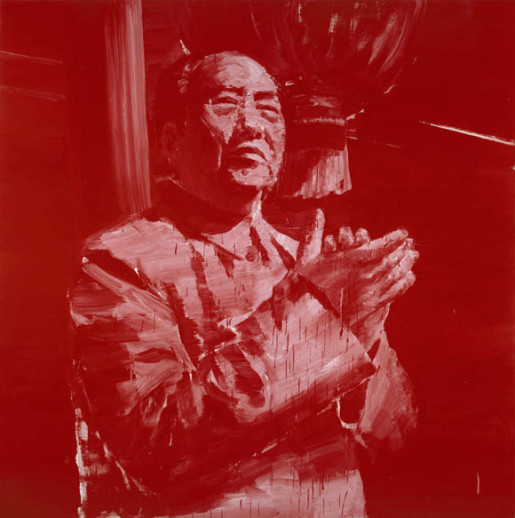
Yan Pei Ming
So, the fact that The Rockefeller Foundation underwrote (and still underwrites) a good many MFA programs (and not just in literature, but in theatre and fine arts) is both relevant, and not. Or maybe a better way to address this is see The Rockefeller Foundation as symptom. I recieved a Rockefeller fellowship, which I hadn’t applied for. But, the very fact that creative writing programs boomed after WW2, and permeated the academic landscape is without question linked to the patronage of institutions like The Rockefeller Foundation (and the MacArthur Foundation, and…). And to deny that the tacit influence of these institutions is idiotic. Now, it’s also true that what John Crowe Ransom and Stegner and Burrows preached is correct. Or its correct up to a point. It is revealing that Melville was derided, because Melville wrote a lot of ideas, and additionally observed the ways those ideas and that knowledge existed in the world. But it is equally true that you do not observe those harpoons so closely, or closely in a particular way, that all you get is a harpoon description. And a so described harpoon that never participates in riots or social unrest, and whose production is unexamined and the harpoon company that distributes it is left blank…the better to describe the fluted morning dew that bifurcates my tabby cat’s shadow on the harpoon handle, and etc etc etc is only a individual’s sensory observation. The harpoon must be known, not just observed. The real point here is that what Iowa started, and many other University programs followed, was to narrow down the definition of “fiction”. Dante would not be considered fiction today. While there is a point in demanding a concrete description, and not a generality, the exclusive focus on the concrete meant that ideas were being eliminated in fiction. The world is not abstract… but that includes History and politics and tensions of daily life. Those offices in New York, or those bad marriages, are not seperate from the Chinese Revolution, or U.S. Imperialism, or the blockade of Cuba or the present two million men and women in prison in the United States. ‘Greatness’, whatever that means, and I have no problem with that word, or the ideas behind it, is in discovering both what that connection is, and ..and this is important I believe…how our own personal emotional and psychic formation, and development are related to both Mao and our failed marriages (or, even the successful ones). The emphasis on observation, on brute description, however eclipsed ideas as a subject for fiction. You may not sit down to write ideas per se, but you certainly have an idea of what a harpoon is. You have to know certain things, and in fact, the best writing is that which tells you what you don’t know, not describes nicely what you already do know. And there is a tendency in young writers to generalize. So on the one hand its natural to emphasize the concrete, but the result, perhaps intentional, or partly so (given the Rockefeller project) was the elimination of ideas in prose, and the narrowing of the definition of what constituted “fiction”.
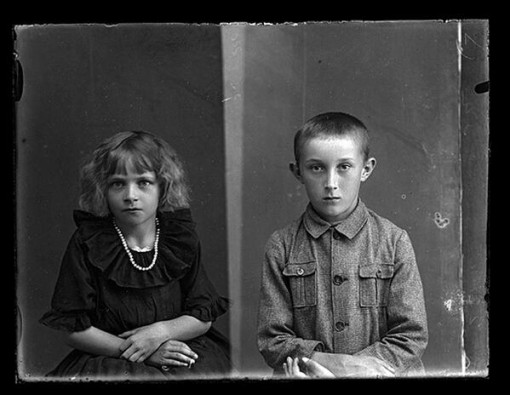
Glass half plate photograph, Poland 1920
But back to instrumental thinking, and institutional influence, in both shaping thought, and political perspectives. Here it is worth disgressing briefly to touch on the idea of experience, which informed so much of Benjamin and Adorno (and others). For Agamben writes: :“…to experience necessarily means to re-accede to infancy as history’s transcendental place of origin. The enigma which infancy ushered in for man can be dissolved only in history, just as experience, being infancy and human place of origink is something always in the act of falling from, into language and into speech.” This is of course problematically romantic and politically regressive. But it also raises a couple important issues. The first is that one make a distinction between language per se, and narrative. It is true, I think, that our primal split, the seperation from our mother, the trauma of infancy in a sense, is profound. But this split is, in another sense, a given of human consciousness. For if one follows the logic of Agamben, then only death reunites us with ourselves, and the effects of war and violence and social alienation are somehow pushed off to the side. There is a trivializing of human violence, and of societal oppression. And Adorno pressed this issue several times, in his very sober renunciation of nostalgia and sentimentality. It serves the purposes, he writes, of “a late superfluous denial that is experienced as a no-exit situation, as only as lost conditions do they become glamorous. Their cult, the cult of pre-subjective phases, arose in horror, in the age of individual disintegration and collective regression.”
For Adorno, there is no lost innocence before the fall into language, but only a restoration of a non dominating relationship between subject and object (Martin Jay). Marcuse too, saw that we cannot know what a non repressed society would look like. So, what is important for the purposes of this posting, is that ‘experience’, our primal mimetic involvement in the world, is narrative, and is shaped and deformed by repression and societal mediations of various kinds. In other words, we cannot fully ever retrieve what was lost, IF it was lost, and whatever it was, that childhood trauma, affects our Utopian dreams, and is part of what aesthetic experience tries and often does partly redeem. It is narrated. We narrate it to each other, and more importantly, to ourselves. Adorno wrote that “For he who has no homeland, writing becomes a place to live.”

James Guthrie
Adorno was writing this during his own exile. And the exile was a potent figure for all the Frankfurt thinkers. Adorno was suspicious of the idea of communication in aesthetic writing. And this starts to bring us back to the Eric Bennett essay. Adorno saw a narrative in atonal music, that commented on an implicit homecoming. That what Shoenberg and Berg were doing, undermining the pre-established goal of return. The return was to arrive at that point of embarkation. And without the proper ‘key’, that return is impossible… and hence a small opening to freedom occurs. The unresolved or antinominal interrogates the form of rationality. This distrust of communication, in a sense, privileges silence as a form of escape. And Adorno saw silence as of exquisite importance in art.
There is a good deal to be said about Adorno’s relationship to Heidegger’s thought here, and it is probably well beyond the scope of this post to attempt to dig too deeply into it here. But the important point is they both fixated on society’s impulse to repeat what “is”. That philosophy and art both look to find the parameters of the linguistic enclosure of experience. And here the question of the specific and particular looms, as opposed to repetitions of the abstract and general. The sense of exile is important in this, and it looms even larger today for a planet of gigantic forced migrations. Expression is embedded in the particular, while communication is mediated by conceptual thought. This is the short version. So what of the rise of MFA writing programs, influenced and funded by state institutions that largely sought conformity under cover of ‘individuality’? Now, there is always, as Adorno said, a ‘conceptual moment’, and this ties in with my notions of narration. For narration is not always conceptual, per se. Or differently conceptual at least. Both Heidegger and Adorno indicted conceptual thinking, or scientific thought that would “expel unregimented experience” (Adorno). The very idea of ‘creative writing’ as understood in University programs, is to valorize regimented experience, again, under cover of individual specificity. And this is in a sense the problem with the institutionalization of expression (finding its furthest exempler in the culture industry). Just beneath the surface of all that individuality is the ‘family of man’ banality. The applauding of difference as long as it’s all the same. And that CIA and Rockefeller imprint ends up, far down the road, in creative writing programs, by default, valorizing the establishment, and by default justifying inequality, and racism and Imperialism. This is not the conscious intention of individual writers, it’s the systemic result. Adorno saw (as did Marcuse and Benjamin) the end of reductionism in linguistic theory to be found in a culture of data and classification (for Heidegger, who was curiously close to them in this respect, it was the end of metaphysics). In another sense, this is exactly what Jonathan Crary talks about in his book 24/7, the constant repetition of a manufactured ‘now’. Historical tensions are erased, and language is only there to help classify data and information. The future is equally erased, and with it any Utopian thought. In terms of aesthetics, or aesthetic experience, there are two aspects in play; one is the experience of the artwork, and the other the positing of questions about subjectivity and objectivity by the artwork, or just subject and object. And I will argue, finally, they cannot be seperated. Or at least they often if not usually overlap. Art allows the possibility of experience unmediated, or less mediated, by a manufactured reality. Another way to say that art repeats the contours of alienation and reification, but with a potential to open, not close, history and dreams, and to disrupt the framing of experience. Art both raises subjectivity as a question, and allows an engagement, an experience, that disunifies the bounderies of subjectivity.

John Divola
The institutional influence on writing, on narrative, has been aligned with specialization and instrumental thought. The “individual” observation is subsumed by the platform on which it is presented, and under it which it was written. Observation is mediated, too. Technology ‘enframes’ experience (Heidegger). Where Adorno saw the problem was in the desire for security of ‘self’. Every close observation is a mini narrative of security. Institutions reinforce this illusion of objectivity. The allegorical is removed through the very claims of being allegorical. This is part of what Dialectic of Enlightement addressed. And it speaks again, to the figure of the exile. A cursory inventory of MFA program writing would yeild, I’m willing to bet, a dearth of exile figures (though, there are certainly plenty of faux exiles, but more on that below). For everyone is already home. And everything is always ‘now’. The narrative sees only itself reflected back. In this sense, the instrumental logic of The Rockefeller Foundation is experienced as de-mythologizing, it invokes only its own legitamacy. Language must embrace that which does not describe, and the exiled word, foreign or vernacular, and the construction of narrative cannot accept a pre-ordained destination. The artist is forever exiled. Is always speaking a foreign language. The new social media generation, raised in an ironic bastion of snark, or cynicism, has come to live with a normalized world of intellectual specialization. They shop for, then buy and then apply the approprate attitude. All of us, I suspect, specialize, and compartmentalize our lives, our emotions, and desires.
Henry Giroux wrote recently:
“Social cynicism and societal indifference accelerate a broken culture in which reason has been replaced by consumer-fed hallucinatory hopes. Surveillance and its accompanying culture of fear now produce subjects that revel in being watched, turning the practice if not the threat posed by surveillance into just another condition for performing the self. “
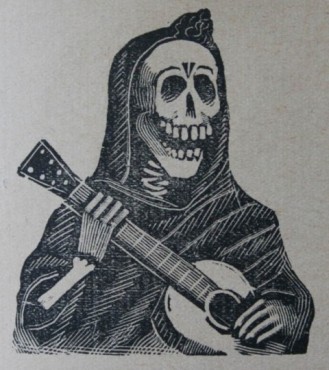
Jose Posada
The logical end of the marketed society has been reached. Id say the seeds of much instrumental thought, the enclosure of sensual experience by institutional authority, and more importantly, the enclosing of narrative began with academic co-opting of fiction. We tell stories to ourselves, but now we tell bad stories, banal stories, and only very short truncated narratives of self. And for whom do we tell them? The solipsistic reasoning of many public intellectuals (sic), the vacuity of accepted writers of fiction and theatre, and the professionalization of writing — the self branding that comes with an MFA degree, the career of writing, is only granted to those ‘expert’ enough to mimic a few of the available and officially sanctioned styles and topics. There is no radical vision buried in MFA programs. And there are no radical ideas, socially radical ideas, because fiction has now come to mean the fiction of the “self”. The desire that writers once had to burn down the institution, to bite the societal hand that barely fed it, and to offend, to insult and more, to keep secret, is all gone. The worst offense is really secrecy. Social media, the NSA, and its subdivisions, on down to local cops, are there to rid society (well the poor, really) of any agency. Any autonomy. You can starve, thats fine. You cannot be mysterious, you cannot have holes in your background check, you cannot NOT have a bank account, or a cell phone. Try existing for a week in New York or London or Los Angeles or Paris, without a cell phone. Try to buy anything. Try to apply for a place to live or a credit card or anything, without a phone number you can provide. You cannot negotiate life without surrendering your privacy, and you cannot survive without an identity that falls within carefully proscribed coordinates. Facebook, twitter, and the like are in many respects not platforms of enjoyment. They are now tools of employment, and survival really. People often hate them, as they hate the police, but there is no escaping them. The first front edges of this story, the story of neo liberal fascsim, began in its current incarnation after WW2, right alongside writing workshops. And alongisde all creativity being professionalized and specialized, and seperated. I suspect more resistance occured among fine artists, than writers. There has been almost none, really, after say 1980 in theatre. The codes of narrative: self identifying what sort of writer you were… fantasy, sci fi, or Ethan Canin or Stegner, or Paul Auster or whoever, among the endless litany of tedious empty prose out there was the default choice of approach. And experience was increasingly the experience of writing about experience.
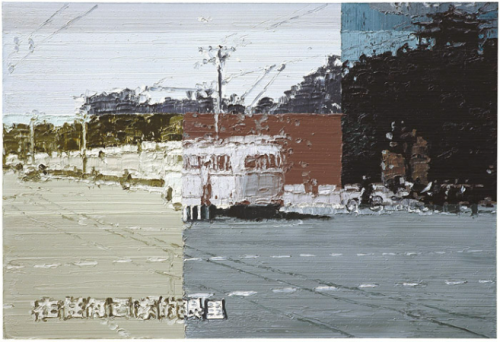
Li Songsong
Giroux again…
“The violence of organized forgetting has another component besides the prevalence of a culture of fear and hyper-nationalism that emerged after 9/11. Since the 1980s, the culture of neoliberalism with its emphasis on the self, privatization and consumerism largely has functioned to disparage any notion of the public good, social responsibility and collective action, if not politics itself. Historical memories of collective struggles against government and corporate abuses have been deposited down the memory hole, leaving largely unquestioned the growing inequalities in wealth and income, along with the increased militarization and financialization of American society.”
Fiction from academic institutions is never really about memory. It is about writing about memory. Characters may have memories, but these invented memories are free of history, or they create a memory-as-movie. There is a filter through which the idea of memory passes, in which the irrational is removed. This isn’t a call for irrationality, but for the unmediated visceral memory. One can trace the increasingly anemic prose of MFA, and of criticism, from John Crowe Ransom, or William Empson, or Kermode or even F.R. Leavis, all conservative in a sense, but retaining some sense of primal originary thinking, as it dilutes and spreads as thin cream of wheat writing, vanilla canned pudding writing, down to Franzan or Zadie Smith. I have always felt the bloodless pallor of Cheever’s prose, or Updike. I never got it. In a sense, the feeling was the same as reading a brochure on patio tiles. A white world of patio tiles. For it always felt contained, tight sphinctered and pissy, no matter the adapted voice, often grand, but usually as weary as the sentences. Ransom and Carver are not great citics, or writers, but today such writing seems almost monumental. Does Iceberg Slim or Dashiell Hammett feel better at present than John Irving? The fiction one finds in The New Yorker, today, is unreadable. But perhaps this model for fiction is exhausted.

Albert Renger Patzch
To return to this question of exile, a final time. The reality of daily life for millions of Americans is one of failure and of loss. And of frustration. It is expected, and even planned for. It is defeat, the internalizing of defeat. And the narration cannot remember. It is a culture running on the logic of Alzheimers. The aperture through which the world is viewed lacks an elsewhere, it is processed in a way close to that of the austistic; and ever more childish and simple, and even that the public often forgets. The culture of losing-the-thread. The loss of affect is given a comedic treatment. A bit like a beer commerical, which always ends with a bewildered mild confusion that resembles most people’s state of mind after three beers.
Huh?
That is the mass cultural posture. Except the ruthless supression of all dissent now is increasingly normalized. I recently read dozens of postings in various blogs, on facebook, about Dylan’s pimping Fiat cars….er…..Chrysler, and the constant refrain, and I mean constant, was “celebrities have a right make money. Who’s to judge”. This is a symptom of that erasure of moral framing, and the installing of corporate framing that requires no history, and no memory. The brand “Dylan” is taken as a whole, a dumb-gestalt, a lot like the Nike swoosh. “Dylan”, and contained in the associations many have with this brand is ‘counterculture’, ‘anti war’, and ‘protest song’.In fact Dylan has always been a reactionary. A supporter of Barry Goldwater, because he resembled Tom Mix, and this posture, all of it manufactured, is just brand building. Cool to love Republicans, cowboys, Americana…just like Detroit and Chrysler (except most of the car is made in Mexico, Canada and Brazil and is owned by Fiat). But the perception is a movie. It’s a Hollywood version of assembly lines, Cimino’s Deer Hunter (also reactionary twaddle..though one could make a case for Heaven’s Gate…but I digress) and on and on. Unions are depicted only in period dramas. The reality of Detroit, ravaged and looted by big Banks, by a corporate ownership class that intends to strip the life out of a great city with an important black history, and replace it with white affulence, gentrification, re-branding. What else was on the national holiday of Super Sunday? Well, Scarlett Johanson was shilling for a SodaStream, after cutting ties with Oxfam. The mass public could care less. She’s a celebrity. Dylan, Scar Jo, and a handful of british actors selling Jaguar. Does Ben Kingsley really need the scratch? There is nothing to critique in one sense, because its all so profoundly empty. Amnesia. Planned mental obsolescence.
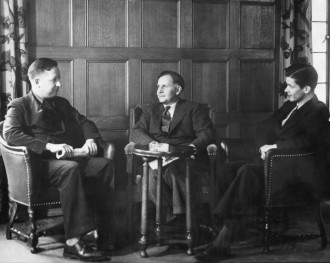
Philip Blair Rice, John Crowe Ransom, Norman Johnson, Kenyon College, 1930s
There is good writing out there, just not much of it coming from MFA programs. What may have provided an engine for a genuine attention to craft, fifty years ago, Rockefeller Foundation notwithstanding, has withered and left an enfeebled cult of pseudo expertise. For the genetic disposition of creative writing programs is linked to the paradoxical stigmatizing and entitlements of University attendance. The goal of the CIA and State Dept is one thing, and we’re talking less than best and brightest here, and the ideological imprint is actually probably minor, but the unintended vaccinations of rationality, the ingesting of sociological and a generic lexical sensibility is significant. Art that has lost anger and moral obsession, has left a low stakes hobby culture of career minded ruthlessness coupled to creative flaccidness. The work is constrained in the same ways, psychologically, that allows mute absorbtion of all aspects of the Spectacle. The concrete and specific becomes generic by a rational process of observation that brackets the irrational and working within the institution is a tacit acceptance of the hierarchies of the system that desires to kill off dissent and opposition, and that means killing off the impulse to question. The white supremacist establishment shares the structural dynamics of the University. MFA program as Pentagon. Now there are exceptions, I guess. But creative writing largely, following the lead of the Iowa Writers Workshop is in the business of staying in business.

Denis Johnson
There are terrific writers who did come out of Iowa; Denis Johnson, William Kittredge, Carver, and Danny Woodrell. Technically Flannary O’Connor did, too, but that was a long time ago. One doesnt want to diminish what was good, even important in the Iowa Writers lab. Robert Bly attended, and then went out and organized against the Viet Nam war, probably more than any other single author. Bly preached politics. O’Connor was gone by 1947. Art is complex, and O’Connor was influenced by John Crowe Ransom, a fellow southerner, and by Paul Engle, who helped edit Wise Blood. So its often too easy to forget the value, at least at the start, of places like Iowa. There was great work. There was also the implanting of certain strains of thought, certain perspectives, that almost imperceptibly domesticated writing. And the domestication took the form of an apolitical idea of specificity, a concrete that is very narrowly defined.

Forsyth Street, Jacksonville Florida, 1910
“And then there are those who find themselves homeless and without a livelihood as a result of the global financial crisis, all the while the corporate architects of this very real and systemic tragedy continue to profit in these crippling times of crises and austerity. Surely we might argue that all these are equally worthy of being described as instances of everyday violence, where political strategies and economic systems render some lives invisible and inaudible, while affirming and legitimating others?
There is a fundamental problem of representation here. Not only are many of our assumptions on violence linked to forms of political authenticity and the right to claim monopoly over the terms peace, security and prosperity. But also beneath the veneer of these types of discourse is the ability to strip lives of the ability to identify precisely the source of oppression and suffering.
What remains is a narrative that focuses on individual failure without any attempt to address the wider conditions of disempowerment, let alone change them for some alternative.”
Brad Evans & Adrian Parr
The master narrative, or narratives today are dialed into an idea of individualism that is only a place holder for erasure of memory and history. How is it that any bit of historical drama from Hollywood so willfully distorts the facts? There is a piece of kitsch junk on Starz network TV this year called Black Sails. What you get is a Disneyland version of pirates, set in the present. Dark glasses, modern smoking pipes, modern sanitation, and the list goes on. Why? Because the culture industry always presents “now”. Or Speilberg’s Lincoln, the Scientology network version of The Kennedys from a couple years back. The list could go on and on, and laid across all of it is a sort of soft porn titillation and a lot of violence. The constant is violence, and much of the porn, come to think of it, is violent too, at least toward women. The point is, the global horrors of neo liberalism, of US militarism, daily destroys thousands of lives, maims and murders countless people, often women and children. This reality, if it appears at all, appears drenched in the sentimental. And again, the forces of geo politics are individualized, same as the individual harpoon. A poor black or Asian or Latino child is saved. Or a story of a mother re-united with her husband after war (never mind the war is always the fault of those resisting Western imperialism), or any of a variety of other redemptive tales that reduce the sweep and monumentality of carnage down to a single narrative of bathos. And in any of these narratives, the causes of militarism are either not addressed, or, as I say, laid at the feet of the victims. Revolutions are treated, uniformally, as acts of terrorism. The desire for peace is ashistorical, and vague and simple minded. Causes are not addressed. Period material, from Hollywood, never examines causes. Why was there a Cuban revolution? Never mind, Castro stole the country. Why was there a Russian or Chinese revolution? Never mind, they are evil states, full of corruption and deceit. This is ALWAYS the default setting. Chinese are oppressive and totalitarian, Russians are corrupt, totalitarian, and repressive. The reality of U.S. censorship, or the U.S. prison gulag, or U.S. poverty is never represented.

Simon Norfolk
At some point artists have to refuse to participate. But, the offer of celebrity, of fame, of money, is the horizon point. The singularity for modern consciousness. Art means entertainment. Serious art means serious entertainment. Ambition is an ambition for success. For privilege and power. And today, the revanchist racism of popular culture has bled into (and maybe it’s the other way round) ‘serious’ prose. Contempt for the poor, or at best indifference. If they appear, it is as curiosity. This is a smiley face world, and suffering is just something to medicate away. The ‘other’ is now so normalized as deserving of punishment as to barely qualify for mention. Drones bomb wedding party. Three children die. This is now so common, so predicatable, that it’s hardly mentioned, and meanwhile if a celebrity gets divorced, there will be reems of copy detailing the suffering. Scar Jo must sell her LA mansion. Kim feels people don’t like her. Miley, Dylan, Obama, Clooney, Nicki Minaj is perplexed that her appropriation of a photo of Malcolm upset people. Geeez, get over it. Jay Z thinks he is his own walking symbolic charity, and will continue to work with Barney’s, and poor Mia, and never mind her history of fraternization with war criminals, she took lots of photo ops with smiling black children for UNICEF. Politics is spectacle. The security of the self must be maintained. Creative writing must be specific. But of what must it be specific?
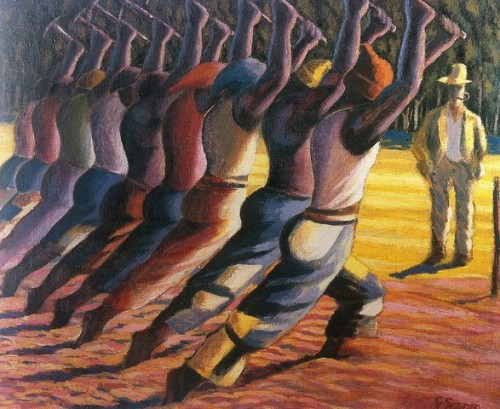
Gerard Sekoto

I suppose Kafka’s “The Trial” would be marked down by those MFA programmes for not being specific enough in its description of Joseph K.’s living quarters and the court-room, etc.
Also, I’d like to recommend Webern, re your theme of mimesis and specificity. Now Romantic music is all about specificity when it comes to programmes and such. “This texture ought to represent this emotion; that ought to personify some character”. Basically, Wagner’s leitmotifs is based on this principle. Now this causes problems because in fact these “specificity” does not actually refer to anything outside of the music, even though it kids itself that it does. So we end up with incredibly sprawling and ingrown music like most of Wagner’s opera.
Webern, on the other hand — I feel like he’s even more emancipated from that than Schoenberg. He’s very far from Romanticism because of the colorless, transparent nature of his atonality. There is no sentimentality, not even a striving after chaos — it’s just very dry (in a good way), very direct orchestration and endless fragmentation of motifs. Like his string quartet, which is somehow aphoristic and is based entirely on intervals. I’m sort of rambling here, but I feel as if it encodes a sort of mystery, that doesn’t refer to any concrete imitation of physical reality, or dramatic reality — yet on the other hand it seems to be a mimesis of a highly specific internal state that is only precisely expressible through music and music alone. You could say here the structure IS the perfect message. The precision is in the precision of the motivic scaffolding.
But then there’s also orchestration, which is why there is actually some mediation going on… it’s not pure notes, it’s not floating in a vacuum; the orchestration is grounding it on concrete physical sensations, timbres, and that’s kaleidoscopically fragmented through the klangfabenmelodie. So it’s a reflection of the messy gritty texture of universe itself, I think. Anyways it’s highly subjective, I have no idea how I’d even begin to substantiate my view here. Just throwing it out there.
Really like all the interesting connections– was pleased to see mention of Webern by previous poster.
This piece brought to mind similar thinking from Carol Bly, who strongly believed MFA programs emphasized technique over ideas and passion. I grew up in northern Minnesota and she lived next door for part of the year. Her (and her ex husband’s) influence led me to avoid taking CW in college but I did learn tremendously from Tom Sleigh’s reluctant workshop when he taught at my college.
I so clearly recall Carol saying the working title for a book she was working on was “Against the Workshop” but it got tamed a bit to “Beyond the Workshop”.
There certainly aren’t many writers with either of Blys vision in today’s “now”.
Another interesting note is that Carol said whenever she taught a writing course the first assignment was always to ask students to write a 10,000 word autobiography so that could be dealt with first off and then –hopefully– they could concentrate on more serious writing….
@exir….i will get to a long comment on your remarks. Love Webern.
@roger………yes, I believe i met carol once. Robert was a friend of terry ork’s and i met him a couple times in NYC, once with james wright…many many years ago. God….late 70s. Anyway, i hadnt realized she died. http://www.startribune.com/entertainment/books/12762077.html
They asked Gary Snyder once about workshops and he said, no, apprentice yourself to someone who knows how to something really well, like a mason or carpenter. Spend a year doing that. Then write.
The work is constrained in the same ways, psychologically, that allows mute absorbtion of all aspects of the Spectacle.
John, I’ve always been skeptical of writing programs. My main issue is that it doesn’t teach history… or the history of literature, which is just history. I don’t see how one can be a writer without knowing what came before – politics, ideas, from the Greeks to the Beats. When I sit down to write, even a measly screenplay, I feel the weight of literature’s history on my shoulders. I’m not saying I’m a good writer, but I’m saying that most of the vacuous writing of contemporary fiction probably doesn’t feel that weight. They write of in the “now.” I’m reminded of the Faulkner quote, “The past isn’t dead, it’s not even past.” Forget the fiction in the NYer. God, it’s unreadable. It all seems so… empty. Literature died for me with Wallace and Bolaño. Now we’re left with cemeteries and tombstones to unearth.
You know, I almost enrolled to NYU’s Tisch dramatic writing graduate program, but a few people who graduated from there wailed against it. Is it even possible to teach writing? I don’t know. I get the feeling that what is “teachable” is really everything you want to forget. I’ve been out of USC for a while now, and I think I’ve finally rid myself of their doctrines. If I were to design my own writing program, I would want to create an environment of constant reading. I would tell the writers to write in the day and read at night. Also, to forget everything they’ve ever learned about writing and push the boundaries of what they believe they can do by betraying something in themselves.
very nteresting stuff
i was thinking about this notion of fiction in relation to the discrediting of democracy,the hatred of democracy that Ranciere takes apart
remember the Badious theses on art? they codify an avant garde that is the perfect foil and complement to this literary mainstream
but the politics of this posture is exposed in passing when Badiou writes about how ‘we all know” how a riot turns into a despotism of ‘the mob’
he’s appealingto his students to recall something they feel tnney know from experience firts hand but which they really have picked up from movies and literature, from fictions,, going back to Flaubert’s sentimental education
they’re supposed to mistake the topos for their own wisdom gained through experience
they’re supposed not to notice they don’t actually have this experience, and indeed their epxeirence – if thhey were say in Seatlle in 99 or paris in 06 or London in 11 — is entirely contrary to this wisdom of the riot turning to a mob despotism
advertisers work toward this in the same way
the kinds of fiction – even the fable – that are acceptable are the kinds that invite this confusion by manipulating the bodymind
i guess thats why the all purpose iinsult is ‘postmodern’, because one of the chaaracteristics of fiction in the 80s and onward was the reflexivity and overt
textuality
this wouldnt require the fiiction to eschew the prductoon of effects that manipulate the bodymind, but it involved the invitation to be conscious of postures toward these manipulations
but this licensed the revivall of those manipulations, the return to practises that the avant garde had sought to deligitimize
the dogma oof the university writing program seems to be these manipulations are acceptable only if there’s no purporse to them other than stimulating readers who have these refined capacities to savour them
that is, so long as they’re not deployed for communist purporses or to delegitimize the status quo
@molly: yes, there is increasingly a very narrow specialized audience….the same of course of philosophy and lit crit. A private vocabulary which makes it easier to exclude the non expert. Its the same with prose. There is a certain set of winks and nudges……that make it clear, you the author knows the code.
And I agree, this whole question of experience and ‘the real’— which i keep writing about because I feel Ive not quite figured it all out, but its a significant discussion I think.